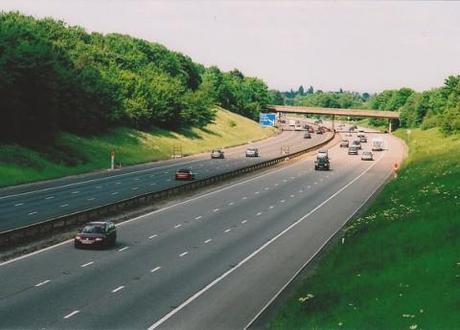
M5 motorway. Photo credit: Andy Welsher, http://flic.kr/p/6taVY3
UK Prime Minister David Cameron has announced plans to overhaul Britain’s faltering road network – to near universal media condemnation. Commentators agree that the country’s transport infrastructure is in dire need of an upgrade. But Cameron’s plans, which include tolls for new roads as well as private investment, have been met with a chorus of protest.
The PM said in a speech on infrastructure that road congestion costs the UK economy £7 billion, reported the BBC, and insisted that innovative new funding ideas were now necessary: “We need to look urgently at the options for getting large-scale private investment into the national roads network, from sovereign wealth funds, pension funds, and other investors,” Cameron said.
But with the prospect of semi-privatisation and the introduction of toll roads set to infuriate motorists, is there another way out of this jam?
Pros and cons. Writing for the BBC, Nick Robinson set out several reasons why roads privatisation may seem attractive to the government, including the fact that UK roads are “hopelessly out of date” and “investment in roads will always be behind schools, hospitals and a lot more besides in the queue of things the chancellor will spend money on”. However, Robinson also identified a major stumbling block: voters won’t like the plans. “The public hate the idea of road tolls. Labour’s examination of road tolls produced an e-petition of 1.7 million names,” Robinson wrote, pointing out that the public isn’t keen either on “anything that smacks of privatising that which they already think they own”.
Good for the private sector, bad for the taxpayer. Cameron should take a history lesson, suggested Aditya Chakrabortty in The Guardian: “Time after time, these public-private partnerships (PPPs) have turned out to be a great deal for the companies, but a terrible bargain for the taxpayer. And on occasion, as with what happened on London’s tube network just four years back, they can lead to outright collapse of the services involved.” Chakrabortty questioned why Cameron appears to believe that private companies can raise money more easily and cheaply than the government in the current financial climate. “The odd thing about all this is that it has never been cheaper for the government to carry out infrastructure projects. Amid a global slump and a dearth of places to put their cash, investors are desperate to lend to safe bets yielding reliable returns…. And George Osborne knows this, which is why he is now talking about taking out 100-year loans to lock in these low rates.”
Picking on motorists. “Tolls are just another gratuitous exploitation of the motorist,” thundered Simon Heffer in The Daily Mail. “Motorists already pay through the nose for an overloaded and crumbling roads system via their Road Fund licence, and through the VAT and excise duty paid on increasingly expensive fuel.” Heffer professed horror that the government seems to expect motorists to foot the bill for a transport network that has crumbled due to years of neglect. “It seems that road-users are being blackmailed in the sense that they are being asked for more money as the price for trying to eradicate the delays they encounter on so many journeys,” Heffer wrote.
Quid pro quo. If the government wants to press ahead with these plans, they need to give something back to the hard-pressed motorist, wrote Philip Johnston in The Daily Telegraph – such as lowering road taxes. Johnston argued that tolls are highly likely if private companies get involved: “If we are to go down this route with our roads, how can companies make a return if they cannot charge tolls for existing road use?.. Mr Cameron might well want the private sector to step in, but it won’t unless it can be guaranteed a profit.” Johnston suggested that there is in fact no good reason why the road network should not be privatised, but “without cutting other road taxes, it will take all of Mr Cameron’s persuasive powers to convince motorists of this. After all, they already pay through the nose every time they get behind the wheel”.
Roads must be improved. A Times (£) editorial argued that road pricing can actually be a good thing: “The London congestion charge reduced traffic in the capital by 21 per cent in its first four years.” In fact, the editorial said, driving in the UK is cheap: “Once a driver has paid Vehicle Excise Duty, he or she can point the car and go. The cost of driving is unrelated to the time traveled or the route taken.” Someone has to step in to deal with Britain’s ailing transport infrastructure – why not the private sector, which can provide capital and “management expertise”?

